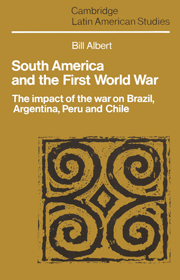Book contents
- Frontmatter
- Contents
- Tables
- Acknowledgments
- Introduction
- 1 Before the War
- 2 The early impact of the War
- 3 The recovery of trade during the War
- 4 Seeking financial solutions
- 5 The War and the growth of manufacturing industry
- 6 The War and the workers
- 7 After the War
- Notes
- Bibliography
- Index
- CAMBRIDGE LATIN AMERICAN STUDIES
3 - The recovery of trade during the War
Published online by Cambridge University Press: 22 October 2009
- Frontmatter
- Contents
- Tables
- Acknowledgments
- Introduction
- 1 Before the War
- 2 The early impact of the War
- 3 The recovery of trade during the War
- 4 Seeking financial solutions
- 5 The War and the growth of manufacturing industry
- 6 The War and the workers
- 7 After the War
- Notes
- Bibliography
- Index
- CAMBRIDGE LATIN AMERICAN STUDIES
Summary
The nineteenth-century system of international economic relations collapsed in August 1914. It was never rebuilt. In the postwar period Britain was unable to play the pivotal role as free trader and investor which had underpinned the balance and sustained the momentum of the world economy. But when the war erupted the British had to establish some means of maintaining trade, for imports of food and raw material were vital for her survival and that of her allies. A strong, though selective, demand for most Latin American commodities, therefore, soon began to make itself felt. However, the rules of the game were now very different. The free play of the market was significantly circumscribed by state regulation and control. Shipping was strictly regulated either by direct compulsion or the rationing of bunker coal. Centralized buying was somewhat slower to develop, this being in line with the British government's “liberal” reluctance to impose economic controls. At first the British took over only the purchase and distribution of sugar. This was one of the country's two most important food imports, all of which came from abroad, and before the war about 75% of which had come from Germany and Austria–Hungary. It was not until 1916 that wheat and other key imports were brought under formal control, although unofficial bulk purchases through agents had been carried out before this time.
Another important aspect of the change to the system of world trade was the economic war waged by both sides. Germany mounted a U-boat campaign, although this did not become a serious menace to the Allies until 1917.
- Type
- Chapter
- Information
- South America and the First World WarThe Impact of the War on Brazil, Argentina, Peru and Chile, pp. 55 - 121Publisher: Cambridge University PressPrint publication year: 1988

